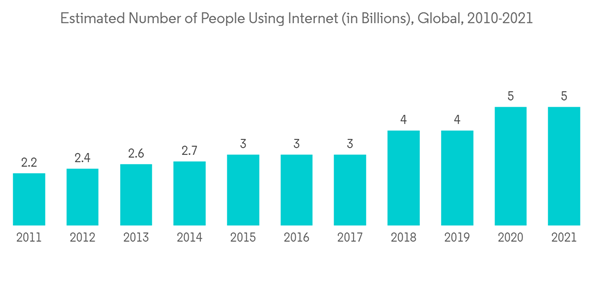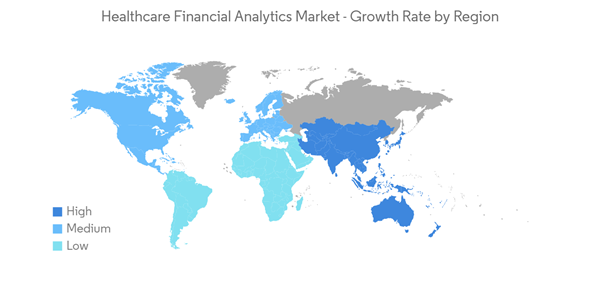The pandemic had an adverse effect on the healthcare financial analytics market. Healthcare analytics is under pressure for a number of reasons, according to an article titled "Tips to Streamline Your RCM Process During COVID-19 Pandemic" which was published in April 2020. First of all, the requirement to record patients with previously unrecorded conditions has caused a great deal of misunderstanding and procedural chaos. Second, billers and coders must keep up with shifting payer needs and coding standards at a rate far faster than the average learning curve. Thirdly, charging for COVID-19 patients must differ from standard billing because the therapy is linked to a pandemic with numerous accompanying regulatory body constraints that have an effect on the market. However, with COVID-19 in the scenario, Telehealth has emerged as an effective method for patients to interact between patients and healthcare providers. This has provided the flexibility to schedule remote appointments to provide initial screenings, offer second opinions, and follow-up with patients which will prevent the spread of the virus. The increase in the digitalization process has increased the demand for more transparent billing procedures, thus driving the market. The European Commission suggested the EU4Health program as a component of a COVID-19 recovery response program, according to an article titled "The European digital health revolution in the wake of COVID-19" that was published in April 2021. The effort intends to raise EUR 5.1 billion for the European health sector's digital transformation and to assure readiness for potential future international health concerns. Therefore, the market expansion throughout the study period will be driven by rising government investments in the digital transformation of healthcare. Thus, COVID-19 has impacted adversely the demand for healthcare analytics, but it is expected to recover with the increase in the number of inpatients and outpatients number.
Big data analytics is a fast-emerging topic in healthcare analytics. The emerging blend of bioinformatics and health informatics has encouraged research in all the healthcare segments, such as target drug, personalized medicine, clinical decision support, and population health management. A core voluntary contribution (CVC) of EUR 340 million over four years was initiated by the Prime Minister of the United Kingdom in September 2020 to support all of the WHO's activities in the nation as outlined in the 13th General Programme of Work. As a result, a number of government measures are to blame for the adoption of RCM platforms, which contribute to the market's expansion. In 2020, National Health Service (NHS) England allocates funds to 191 Clinical Commissioning Groups, which govern and pay for care delivery at the local level. The NHS provides free public health care, including hospital, physician, and mental health treatment, to all national residents on an automatic basis. The NHS is responsible for determining the strategic direction of health information technology, including the creation of online appointment booking systems and the establishment of quality standards for prescription and medical record-keeping software. As a result, the market under study will be driven by the usage of revenue cycle management software for better reimbursement processes. Additionally, initiatives by key market players are another factor in market growth. For instance, in August 2020, Quantzig launched advanced clinical data analytics solutions to help healthcare, pharma, and life science companies lead their way out of the pandemic with data-driven insights. Thus, the abovementioned factors are expected to increase market growth.
However, the lack of properly trained IT professionals in healthcare is expected to hinder the market growth.
Healthcare Financial Analytics Market Trends
Cloud Based Segment is Expected to Show Significant Growth over the Forecast Period
Based on deployment, the market is segmented into on-premise, and cloud-based. The cloud-based segment is expected to show better growth during the forecast period, owing to the Increasing adoption of cloud platforms. The financial analytics market is driven by the rising application of cloud analytics as it allows organizations to incorporate data from all sources. In addition, the demand for better claims and revenue management systems in healthcare and cloud computing acceptance across various industries has pushed financial planning to a new level and is expected to have a positive effect on the healthcare financial analytics market. Governments in several European nations are launching initiatives to encourage the development of information technology in healthcare. For example, over two million National Health Services (NHS) mail mailboxes were transferred to Exchange Online, a component of Microsoft's Azure Cloud, in February 2021 as part of the United Kingdom government's initiative to adopt a fully connected cloud-driven health service. As a result, communication between staff members of NHS organizations and departments will be easier and more effective, and the information available will be increased. This will improve market expansion and increase the use of Health Information Technology (HCIT) Change Management services in the United Kingdom. The combined actions undertaken by regional market participants and governmental agencies are also contributing to the sector's expansion. For instance, Deutsche Telekom's T-Systems has teamed with Google Cloud to develop and deploy sovereign cloud services to German businesses, healthcare providers, and the general public starting in September 2021. Together, the businesses will innovate to provide a wide range of next-generation sovereign cloud infrastructure and products. The business is thinking of constructing a comparable sovereign cloud for Austria and Switzerland. Thus, the abovementioned factors are expected to increase the market growth.North America Dominates the Healthcare Financial Analytics Market
The healthcare infrastructure in North America is expected to reflect positive trends in the financial analytics domain, owing to factors such as technological advancements, and high requirements for management of big data generated from hospitals and other healthcare facilities. Furthermore, the growing popularity of software in the management of data reduces the manpower leading to increased adoption of healthcare financial analytics. Hence, the rising demand for advanced technologies across various verticals is expected to enhance the growth of the studied market. Through several laws and programs, the federal government promotes the use of its healthcare data. The Department of Health and Human Services is permitted to publish data that encourages transparency in the markets for healthcare and medical insurance under the terms of the Affordable Care Act (ACA), the most significant piece of healthcare legislation in the United States. The government has taken the necessary steps to release data from organizations like the Centers for Medicare and Medicaid Services, the Food and Drug Administration, and the Centers for Disease Control. It is also providing financial incentives for healthcare providers to use electronic medical records. Similar to this, the healthcare analytics market is being driven by strategic initiatives taken by major market participants to improve the standard of healthcare. In March 2020, Definitive Healthcare and ESRI collaborated to create a platform that allows for the study and monitoring of hospital bed capacity and possible COVID-19 risk by geographic regions in the United States. As a result, the market in the area is likely to develop. Government payers, including Medicare and Medicaid, are quickly embracing value-based purchasing and capitated payment models where outcomes will be tracked and rewarded. Predictive analytics will become just as important to the success of this new model as the suppliers. As a result, the increased demand for and use of analytical tools and solutions is anticipated to fuel market expansion.Healthcare Financial Analytics Industry Overview
The healthcare financial analytics market is partially fragmented and consists of several major players. The global players in the healthcare financial analytics market are IBM, Allscripts Healthcare Solutions, Cerner Corporation, Health Catalyst, Mckesson Corporation, Optum Inc, Oracle Corporation, SAS Institute Inc., and Verisk Analytics, Inc. among others.Additional Benefits:
- The market estimate (ME) sheet in Excel format
- 3 months of analyst support
This product will be delivered within 2 business days.
Table of Contents
Companies Mentioned (Partial List)
A selection of companies mentioned in this report includes, but is not limited to:
- IBM
- Allscripts Healthcare Solutions
- Cerner Corporation
- Health Catalyst
- Mckesson Corporation
- Optum Inc
- Oracle Corporation
- SAS Institute Inc.
- Verisk Analytics, Inc
- CitiusTech Inc
- CVS Health
- Inovalon










